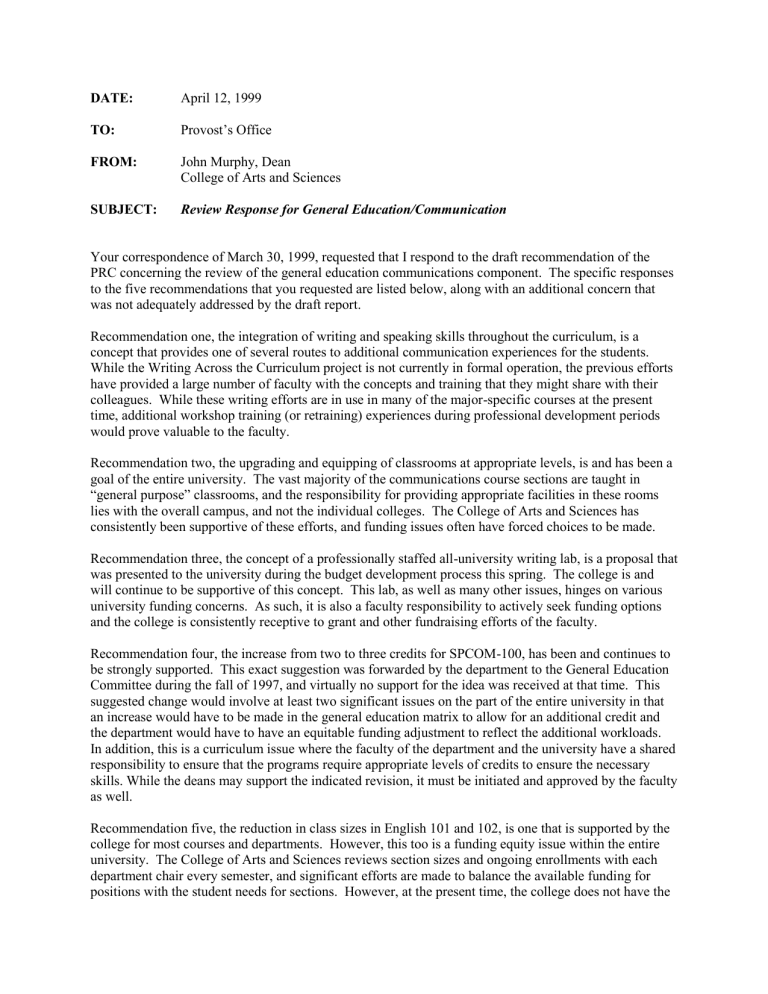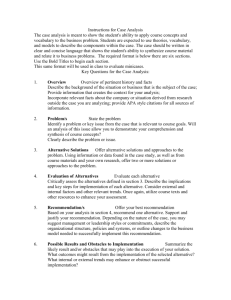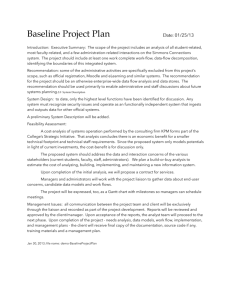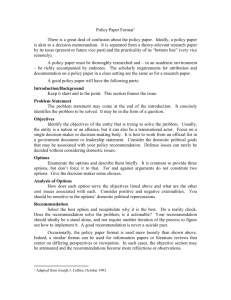DATE: TO: FROM: SUBJECT:

DATE:
TO:
FROM:
April 12, 1999
Provost’s Office
John Murphy, Dean
College of Arts and Sciences
SUBJECT: Review Response for General Education/Communication
Your correspondence of March 30, 1999, requested that I respond to the draft recommendation of the
PRC concerning the review of the general education communications component. The specific responses to the five recommendations that you requested are listed below, along with an additional concern that was not adequately addressed by the draft report.
Recommendation one, the integration of writing and speaking skills throughout the curriculum, is a concept that provides one of several routes to additional communication experiences for the students.
While the Writing Across the Curriculum project is not currently in formal operation, the previous efforts have provided a large number of faculty with the concepts and training that they might share with their colleagues. While these writing efforts are in use in many of the major-specific courses at the present time, additional workshop training (or retraining) experiences during professional development periods would prove valuable to the faculty.
Recommendation two, the upgrading and equipping of classrooms at appropriate levels, is and has been a goal of the entire university. The vast majority of the communications course sections are taught in
“general purpose” classrooms, and the responsibility for providing appropriate facilities in these rooms lies with the overall campus, and not the individual colleges. The College of Arts and Sciences has consistently been supportive of these efforts, and funding issues often have forced choices to be made.
Recommendation three, the concept of a professionally staffed all-university writing lab, is a proposal that was presented to the university during the budget development process this spring. The college is and will continue to be supportive of this concept. This lab, as well as many other issues, hinges on various university funding concerns. As such, it is also a faculty responsibility to actively seek funding options and the college is consistently receptive to grant and other fundraising efforts of the faculty.
Recommendation four, the increase from two to three credits for SPCOM-100, has been and continues to be strongly supported. This exact suggestion was forwarded by the department to the General Education
Committee during the fall of 1997, and virtually no support for the idea was received at that time. This suggested change would involve at least two significant issues on the part of the entire university in that an increase would have to be made in the general education matrix to allow for an additional credit and the department would have to have an equitable funding adjustment to reflect the additional workloads.
In addition, this is a curriculum issue where the faculty of the department and the university have a shared responsibility to ensure that the programs require appropriate levels of credits to ensure the necessary skills. While the deans may support the indicated revision, it must be initiated and approved by the faculty as well.
Recommendation five, the reduction in class sizes in English 101 and 102, is one that is supported by the college for most courses and departments. However, this too is a funding equity issue within the entire university. The College of Arts and Sciences reviews section sizes and ongoing enrollments with each department chair every semester, and significant efforts are made to balance the available funding for positions with the student needs for sections. However, at the present time, the college does not have the
funding necessary to achieve significant reductions in class sizes in most areas, including those of the communications component.
A last point on an area of the communications component that is not adequately addressed in the report is mentioned as the fourth issue of concern. The report does not include any discussion of the near-total lack of advanced writing, advanced speaking and foreign language courses accessible to students within the component (or the entire general education matrix). The assumptions of the draft report that any adjustments to the credit levels in programs and/or the general education matrix seem to lead to an omission of any discussion of these important concerns for the future graduates of the university. The college cannot accept an unrealistic notion that nothing can or should be done in these important areas because the program credit matrix is unchangeable. In the actual words of the report, “A requirement of only eight credits is insufficient…for producing articulate graduates, workers and citizens.”





